MercoPress. South Atlantic News Agency
Latin America
-
Saturday, October 11th 2014 - 01:47 UTC
UN Human Rights Council calls for immediate release of Venezuelan dissident Leopoldo Lopez

The United Nations adopted a resolution Wednesday decreeing the Venezuelan government should immediately release Leopoldo Lopez, the opposition leader who has been imprisoned for almost nine months in connection to the violent protests in Caracas in February.
-
Friday, October 10th 2014 - 05:01 UTC
Latam headed for a third year of foreign trade stagnation, reports ECLAC

Latin America and the Caribbean's foreign trade will experience its third year of stagnation in 2014, because of minimal growth in exports and a slight decline in imports, the Economic Commission for Latin America and the Caribbean (ECLAC) reported on Thursday.
-
Thursday, October 9th 2014 - 10:36 UTC
YPF goes overseas: signs agreement with Ecuador to recover mature fields
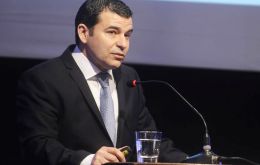
Argentina's state-run energy company YPF closed on Wednesday an agreement with Ecuador's state-owned company Petroamazonas for the enhanced recovery of the mature field of El Campo Yuralpa which will demand an investment in the range of 170 million dollars.
-
Thursday, October 9th 2014 - 08:04 UTC
Colombia and Panama in retaliatory clash over tax haven controversy

Panama on Wednesday rejected its inclusion on Colombia's list of tax havens and said it will take retaliatory action against its neighbor. Panama has “a competitive and sound tax system, and therefore the national government categorically rejects any tax-haven designation,” the Central American nation's Foreign Ministry said in a statement.
-
Thursday, October 9th 2014 - 07:59 UTC
OAS Electoral observation mission in Bolivia for Sunday's election
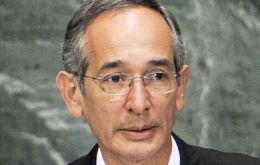
Former Guatemalan president Alvaro Colom has arrived in La Paz as Chief of the Electoral Observation Mission from the Organization of American States (OAS/EOM) to head the group of 63 people who will observe Bolivian general elections of 12 October.
-
Thursday, October 9th 2014 - 06:08 UTC
Mercosur finally agrees: unified number plates for new cars beginning 2016
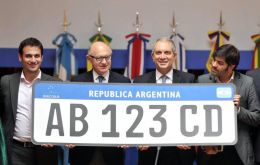
The five full members of the Mercosur trade bloc will use unified number plates for their 0km vehicles starting in 2016, Argentine Foreign Minister Hector Timerman announced on Wednesday from San Martín Palace in Buenos Aires city.
-
Wednesday, October 8th 2014 - 21:46 UTC
OAS Observers mission to Peru recommends unifying electoral legislation
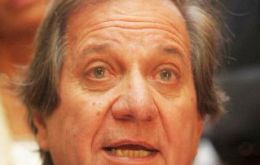
The head of the OAS Electoral Observation Mission in Peru, Uruguayan Senator Sergio Abreu underlined the orderly way in which Peruvians went to vote on Sunday's regional and municipal elections, this despite some regrettable episodes of violence in the pre-election phase, Election Day at some polling stations, and at the conclusion of voting in some departments.
-
Wednesday, October 8th 2014 - 08:24 UTC
Uruguay presidential race to be decided in runoff in November seems confirmed by latest poll

A run off in November to elect Uruguay's president seems most certain because none of the two leading candidates will manage a majority in the first round on 26 October, according to the latest public opinion poll.
-
Wednesday, October 8th 2014 - 04:05 UTC
World Bank: end of boom doesn’t have to mean a bust for the poor in Latin America

During the recent commodity boom, Latin America and the Caribbean proved that growth could be pro-poor and help fuel tremendous social progress. Now as growth slows regionally and beyond, it is critical to consider what will shore up economic activity while ensuring the poor won't stay behind.
-
Monday, October 6th 2014 - 05:56 UTC
Dilma (40%) and Neves (34%) to the runoff; mathematically the opposition can win
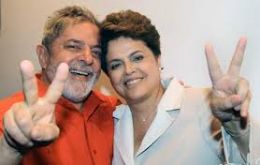
Brazil's unpredictable election took another twist Sunday, with populist President Dilma Rousseff forced into a runoff race as expected, but against a center-right challenger who only surged in the final week of the campaign.
